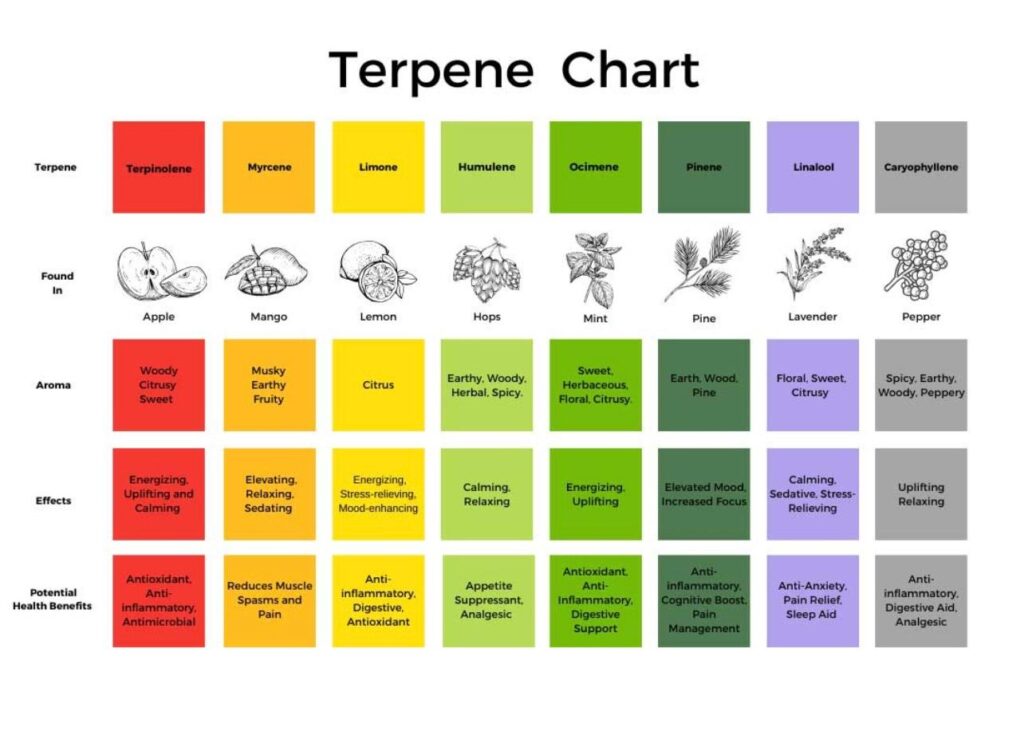The world of cannabis is vast and complex, boasting a variety of compounds that contribute to its effects and therapeutic benefits. Among these, terpenes and cannabinoids hold a particularly significant place. Terpenes are aromatic compounds found in many plants, including cannabis, which are believed to influence its effects and may play a critical role in what is known as the “entourage effect.” This concept suggests that the therapeutic impacts of cannabis are enhanced when its various natural components interact synergistically. However, the scientific community continues to debate this theory, calling for more research to fully understand the potential of terpenes in enhancing the effects of cannabinoids.
What Are Terpenes?
Terpenes are volatile aromatic molecules that evaporate easily and readily announce themselves to the nose. Found in the essential oils of plants, they are responsible for the aroma and flavors of cannabis and many other botanicals. Some well-known terpenes include limonene, pinene, and linalool, each contributing not only to the sensory experience but potentially to the medicinal qualities of cannabis.

Terpenes and the Entourage Effect
The entourage effect is a theory that proposes that cannabis compounds work better together than they do alone. Terpenes are thought to play a significant role in modulating the effects of cannabinoids like THC and CBD, potentially enhancing their benefits or mitigating their side effects. For example, myrcene is believed to help THC penetrate the blood-brain barrier more effectively, while limonene might boost mood or relieve stress.
Current Research and Its Limitations
While anecdotal evidence strongly supports the entourage effect, scientific research remains in its infancy. Few studies have explored how terpenes and cannabinoids interact in humans, and existing research often relies on animal models or in vitro experiments. These studies suggest potential interactions, but they don’t provide conclusive evidence applicable to human biology.
Key Findings:
• Synergistic Effects: Some laboratory studies have shown that certain terpenes might enhance the ability of cannabinoids to fight pain, inflammation, depression, anxiety, addiction, epilepsy, cancer, fungal and bacterial infections.
• Modulating Effects: Terpenes might affect the pharmacokinetics of cannabinoids, potentially influencing their absorption, metabolism, and excretion.
• Therapeutic Potential: Individual terpenes have been found to possess therapeutic properties that might contribute to the overall effects of cannabis-based treatments.

The Need for More Research
To truly understand the potential of terpenes in the entourage effect, more comprehensive studies are needed. These studies should be well-designed clinical trials with human participants, focusing on the interactions between specific terpenes and cannabinoids under controlled conditions.
Research Priorities:
1. Identifying Synergies: Which terpenes most effectively enhance the therapeutic effects of specific cannabinoids?
2. Dosing and Ratios: What are the optimal ratios and combinations of terpenes and cannabinoids for different medical conditions?
3. Mechanism of Action: How exactly do terpenes interact at molecular and cellular levels to affect the body?

Conclusion
The potential of terpenes in enhancing the efficacy of cannabinoids through the entourage effect is a fascinating area of cannabis research that holds much promise. With increasing interest and legalization of cannabis worldwide, it is crucial that future research provides clear, science-backed evidence to support or refute these claims. For now, while the anecdotal benefits are compelling, scientific validation is essential to fully understand and harness these complex botanical interactions in cannabis.
This blog serves as an introductory exploration into the complex interactions between terpenes and cannabinoids in cannabis. As research progresses, it is anticipated that our understanding will expand, potentially opening up new pathways for therapeutic applications. For those interested in the science of cannabis and its broader implications, staying informed about new studies and breakthroughs will be key.







